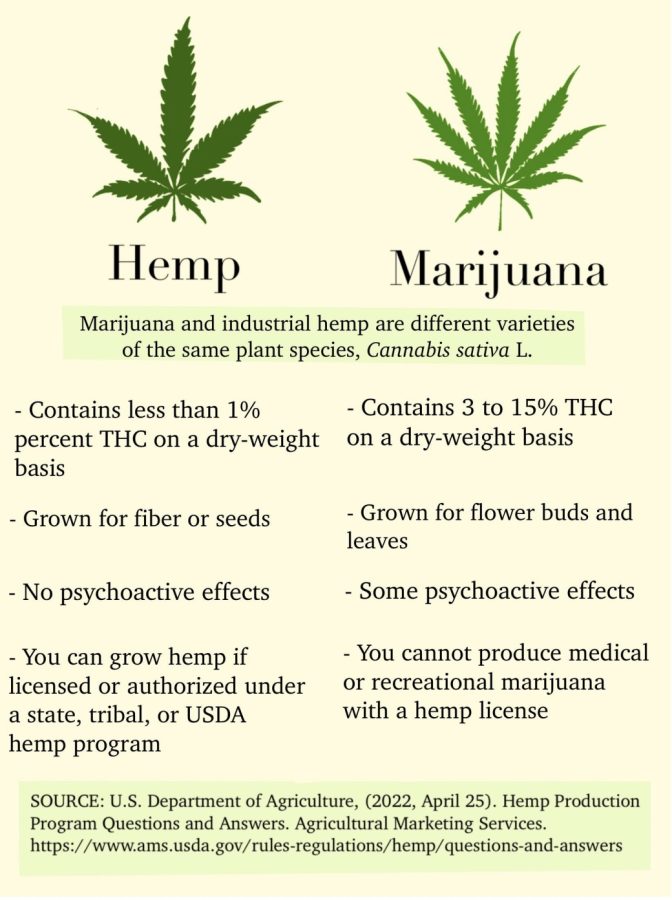WNC residents benefit from using hemp-derived products as self-medication
Information on hemp production courtesy of the U.S. Department of Agriculture
February 3, 2023
From students to service workers, some North Carolina residents are using hemp, CBD and Delta-8 products to alleviate symptoms of their pre-existing conditions.
“I feel like almost everyone on campus has smoked at least a little,” said UNCA senior Kai Tilly.
Some UNCA students who are of legal age to purchase Delta-8 products are using them to self-medicate. This is the case for Kai, a 21-year-old who has recently started smoking Delta-8 and consuming cannabis-infused gummies in the past year.
Hemp and medical marijuana come from the same genus and have many of the same chemical compounds. The legal difference between them is the amount of Tetrahydrocannabinol (THC) the plant contains; if a cannabis plant contains more than 0.3% THC it is considered marijuana, according to the USDA.
“It makes me feel less stressed whenever I’m really anxious. It also helps me get to sleep,” Tilly said.
North Carolina has legalized all derivatives, cannabinoids, extracts and isomers derived from hemp. These products are legal as long as the Delta-9 concentration is no more than 0.3%, according to the General Assembly of North Carolina.
Alongside insomnia, Kai uses cannabis to treat their ADHD, as they prefer its effects over the medicine they have taken in the past.
Marijuana is the most commonly used federally illegal drug in the United States, about 18% of Americans used it at least once in 2019, according to the CDC.
“Weed needs to be decriminalized because it’s not necessarily a harmful drug like all the other hard drugs out there,” said Tilly.
The CDC states using CBD products is not risk-free. Some possible side effects are liver damage, drowsiness or sleepiness, diarrhea or changes in appetite and changes in mood, such as irritability.
Adia Bohanon, 42, has been self-medicating with cannabis products for 28 years to alleviate the symptoms of fibromyalgia, insomnia and anorexia. Bohannon said she typically uses disposables, hemp, cannabis-infused gummies and D8 drops.
“The primary way in which they help is sleep which can be a struggle with insomnia and a pain condition. Secondarily, they help me want to eat, something I’ve struggled with since I was a teenager,” said Bohanon.
Consuming cannabis can increase a person’s appetite by stimulating cannabinoid receptors in the brain, releasing a hormone to increase food intake, according to Innovations in Clinical Neuroscience.
“The legalization of the products is significant on many levels. One, it would be undoing the toxic stigma of hemp and cannabis that started in the 1940s when it was banned for political reasons and agendas. Those agendas included the beginning of the DEA and the end of the hemp industry,” said Bohanon.
The Controlled Substance Act of 1970 has established cannabis as a Schedule I drug, although 37 states have currently legalized medicinal marijuana use.
“Legalizing hemp alone could single-handedly end the unsustainable tree paper industry among other things. Legalizing other products would empty prisons, create billions of dollars in revenue and end the need for many of the heavy drugs doctors rely on for a long list of medical ailments,” said Bohanon.
The CDC states that a fatal overdose caused solely by marijuana is unlikely but it is not harmless. Overusing can lead to poisoning causing nausea and difficulty breathing.
Brian McMinn, 52, is currently the president of a non-profit organization called One World Effort.
“I had a family member who moved to California and worked for a small hemp farm and learned the ins and outs of the business while there. We talked about how we could bring his knowledge of the industry to North Carolina,” said McMinn.
In 2021, the value of hemp production in the open and under protection for the United States totaled $824 million, according to the USDA.
“We have acquired 40 plus acres, and a portion will be used to plant and cultivate industrial hemp. Hopefully, our first harvest should generate between $68,000 and $900,000 of revenue,” said McMinn.
In 2021, the total planted area for industrial hemp grown out in the open for all utilizations in the U.S. was 54,152 acres, according to the USDA.
“A lot of business in this industry comes from word of mouth, so it’s about having quality products and people spreading the word to their friends, family and even coworkers,” said McMinn.
According to the DEA, marijuana is a Schedule I substance due to its potential to be abused, having no accepted medical use in treatment in the U.S. and a lack of accepted safety under medical supervision.
McMinn said his next step is to begin a 17,000 plant growth this upcoming spring.
The Agricultural Improvement Act of 2018 removed industrial hemp from the controlled substances acts, making hemp a legal agricultural commodity, according to the North Carolina Department of Agriculture.
“We love the benefits of growing hemp, but the biggest is knowing our hard work pays off when our customers use our product to help people who need CBD for pain, anxiety, etc,” said McMinn.


















